
Episode 2 of “Six Wives with Lucy Worsley” focused on Anne Boleyn and Jane Seymour, although Jane didn’t get much attention, and took us from Anne’s rise through to Jane’s death. I’d love to hear your thoughts on it.
[Read More...]
Episode 2 of “Six Wives with Lucy Worsley” focused on Anne Boleyn and Jane Seymour, although Jane didn’t get much attention, and took us from Anne’s rise through to Jane’s death. I’d love to hear your thoughts on it.
[Read More...]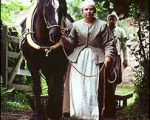
One of my all-time favourite history programmes is the 12-part series “Tales from the Green Valley” which was aired back in 2004. It was the fore-runner of the popular Victorian Farm/Edwardian Farm/Tudor Monastery Farm series and featured Ruth Goodman, Alex Langlands, Peter Ginn and other historians and archaeologists living as rural people would have done in the early Stuart period. It really is a wonderful series…
[Read More...]
Today’s Claire Chats is about “The Forme of Cury” manuscript and primary sources for medieval and Tudor cookery and food.
[Read More...]
Many medieval and Tudor cookbooks and recipe manuscripts have been transcribed and are available to read online or in books. Here are links to those I have found so far. I hope you find them useful.
[Read More...]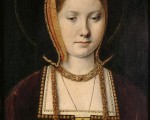
12 December:
1546 – Henry Howard, Earl of Surrey was led through the streets of London from Ely Place, where he had been held since the 2nd December, to the Tower of London. There, he was joined by his father, Thomas Howard, 3rd Duke of Norfolk, who was taken to the Tower by barge along the Thames.
1574 – Birth of Anne of Denmark, Queen of England, Scotland, and Ireland as consort of James I, at Skanderborg Castle, Jutland, Denmark. Anne was the second daughter of Frederick II, King of Denmark and Norway, and his wife, Sophia. She married James I, when he was James VI of Scotland, by proxy on 20th August 1589, and in a proper church ceremony on 23rd November 1589. The couple’s children included the future Charles I and Elizabeth Stuart, Queen of Bohemia. Anne died on 2nd March 1619 of consumption and dropsy, and was buried in Henry VII’s Chapel, Westminster Abbey.
1595 – Death of Sir Roger Williams, Protestant Welsh soldier and author, from a fever with his patron, Robert Devereux, Earl of Essex, at his side. He was buried at St Paul’s Cathedral. William served as a soldier in the Low Countries and France, and was second in command to Essex of the cavalry gathered at Tilbury in 1588. He wrote the 1590 “A Briefe Discourse of Warre”.
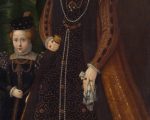
On 11 December 1581, Maria of Austria, Duchess of Jülich-Kleve-Berg, passed away at Hambach Castle. Maria began her life on 15 May 1531 in Prague, where she was welcomed as the third daughter and fifth of what would be fifteen children from the marriage of Ferdinand I, Holy Roman Emperor, and Anna Jagiello of Bohemia and Hungary. Ferdinand was a younger brother of Charles V, Holy Roman Emperor, and took up the position vacated by Charles in 1558. Maria was, therefore, niece to Charles V and cousin to Christina and Dorothea of Denmark.
[Read More...]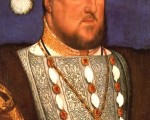
Thank you so much to Jean Pascal for sharing this news with me. A letter written by Henry VIII to Francis I is being auctioned in Lyon on 15th December.
[Read More...]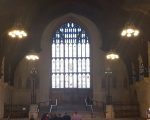
Thank you to Sarah Bryson for today’s chat video. Sarah talks about the history of the hall and her experience visiting it.
[Read More...]
Historian and Tudor Life Magazine editor Gareth Russell will be joining us in the chatroom for a live chat at 11pm UK time on Friday 16th December.
[Read More...]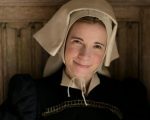
For those of you interested in the new BBC series “Six Wives with Lucy Worsley”, I found the first episode, which was aired last night (7th December) on YouTube
[Read More...]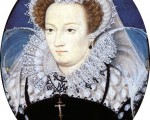
On this day in history, 8th December 1542, Elizabeth I’s nemesis, Mary, Queen of Scots, was born at Linlithgow Palace in Scotland.
Mary, Queen of Scots was the daughter of James V of Scotland and his second wife, Mary of Guise, and the granddaughter of Margaret Tudor (Henry VIII’s sister) and James IV of Scotland. On the 14th December, when she was just six days old, Mary became Queen of Scotland after her father died of a fever. She was crowned Queen on 9th September 1543 at Stirling Castle. As Mary was a baby, James Hamilton, 2nd Earl of Arran, acted as regent until 1554 when he surrendered the regency to Mary’s mother, Mary of Guise, who acted as regent until her death in 1560.
[Read More...]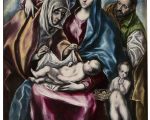
Today, many countries around the world celebrate the Feast of the Immaculate Conception. This feast day does not celebrate the immaculate conception of Jesus Christ, which is known as “the Virgin Birth”, but instead celebrates the immaculate conception of his mother, the Virgin Mary, in the womb of her mother, St Anne. Mary’s immaculate conception meant that she was conceived free of the taint of original sin, unlike other women.
[Read More...]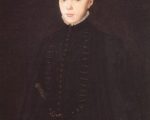
As today is the traditional date given for the birth of Henry Stewart (Stuart), Duke of Albany and Lord Darnley, I thought I’d share this excerpt from On This Day in Tudor History.
Henry Stewart, Lord Darnley, was the son of Matthew Stewart, 13th or 4th Earl of Lennox, and Lady Margaret Douglas, and the grandson of Margaret Tudor and her second husband Archibald Douglas, 6th Earl of Angus. He was born at Temple Newsam, Yorkshire, not long after the death of his older brother, also called Henry. Darnley is known for being the second husband of Mary, Queen of Scots and for being murdered on 10th February 1567.
[Read More...]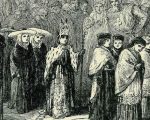
The 6th December was and is the feast of St Nicholas, or St Nicholas of Myra, the 4th century Bishop of Myra (modern-day Demre in Turkey), who is the patron saint of children, as well as sailors, merchants, archers, repentant thieves, brewers, pawnbrokers and students. In medieval and Tudor times, it was traditional for a choirboy to be chosen on 6th December or Childermas (Holy Innocents’ Day) as “Boy Bishop” to act as bishop and to lead processions around communities, collecting money for the church and parish funds, and to lead some religious services.
[Read More...]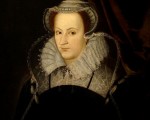
5th December:
1556 – Birth of Anne de Vere (née Cecil), Countess of Oxford, daughter of William Cecil, 1st Baron Burghley, and his second wife, Mildred (née Cooke), and wife of Edward de Vere, 17th Earl of Oxford. The marriage was not the happiest of matches, with de Vere refusing to acknowledge their daughter Elizabeth as his. The couple were eventually reconciled.
1558 – Death of Gabriel Dunne (Donne), Abbot of Buckfast and ‘keeper of the spiritualities’, in the diocese of London. He was buried at St Paul’s, before the high altar.
1560 – Death of King Francis II of France and King Consort of Scotland as husband of Mary, Queen of Scots. Francis was aged just fifteen when he died from some type of ear infection. He was succeeded as King of France by his brother, Charles, who became Charles IX. Francis was buried at the Cathedral Basilica of Saint-Denis on 23rd December.
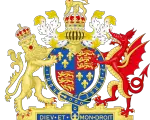
How much do you know about the mottoes of monarchs and their consorts? Test yourself with this fun quiz.
[Read More...]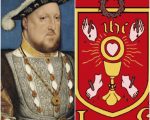

I was lucky enough to be given a bagful of quinces by some friends so I decided to look in my medieval and Tudor recipe books for some quince recipes and found this one. I hope you enjoy it and do let me know if you try it and what you think. It really is delicious and is disappearing fast in our household.
[Read More...]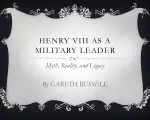
Gareth Russell discusses the successes and failures of Henry VIII as a military leader, leading to some interesting and damning conclusions.
[Read More...]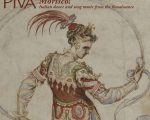
I know many of you enjoy Jane Moulder’s articles on Renaissance music in Tudor Life magazine, so I wanted to share with you this press release for Jane’s group’s brand new CD “Morisco!”. It’s not available as a digital download yet, but you can buy the CD from the Piva website.
[Read More...]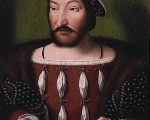
This is Part II of a four-part series, which seeks to look at what were considered the attributes of a Renaissance prince, and who of our four princes embodied the ideals of the Renaissance best. What were some of those themes? The idea of a Renaissance man stood for a person who strove to embrace knowledge and develop himself. This included concepts such as the arts, knowledge, physical achievements, and social ideals. More plainly and for a prince, this could include cultivating a court known for patronizing artists, musicians, and the like; establishing educational institutions, a good degree of physical fortitude, and things such as chivalric love or engaging in acts of charity.
[Read More...]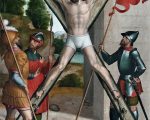
30th November was and is the feast of St Andrew the apostle, who is also the patron saint of Scotland. Andrew was the older brother of the Apostle Peter and the two of them were fishing when Jesus approached them and said that he would make them “fishers of men”.
Following Christ’s crucifixion, Andrew travelled around preaching the Good News (some sources say as far as Kiev and Veliky Novgorod in Russia) before he was crucified on an X-shaped cross in Patras, Greece. Andrew is the patron saint of fishermen and singers, as well as Scotland, Ukraine, Romania, Russia and Patras. The saltire, or St Andrew’s Cross, is used on the flag of Scotland.
[Read More...]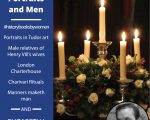
Merry Christmas! Here’s the December Tudor Life Magazine, an 80-page magazine packed with facts, fun and festivity. There’s a full 20-page feature on Tudor portraits, and there’s even a “Cut out Elizabeth I” fun activity! Enjoy this month’s magazine.
[Read More...]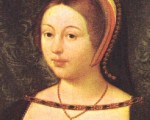
28 November:
1489 – Birth of Margaret Tudor, Queen of Scotland and consort of James IV, at Westminster Palace. Margaret was the eldest daughter of Henry VII and his wife, Elizabeth of York, and the sister of Henry VII. She spent her childhood at Sheen and at Eltham Palace, but was sent to Scotland at the age of thirteen to marry James IV.
1499 – Execution of Edward Plantagenet, styled Earl of Warwick, on Tower Hill. Edward was the son of George, Duke of Clarence, brother of Edward IV and Richard III, and so was a potential claimant to the throne. He was imprisoned in the Tower of London after Henry VII’s accession, and was executed for treason after the pretender Perkin Warbeck had allegedly plotted to free himself and Edward. He was buried at Bisham Abbey.
1557 – Death of Sir Robert Rochester, administrator. He was buried at the Charterhouse at Sheen. Rochester served Mary I as Comptroller of the Royal Household, Privy Councillor, Chancellor of the Duchy of Lancaster, Keeper of the Privy Seal and a member of Parliament.
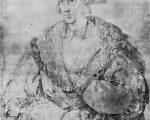
On this day in history, 27th November 1556, Henry Parker, 10th Baron Morley, nobleman, diplomat, translator and father of Jane Boleyn (wife of George Boleyn), died at his home, Hallingbury Place, in Great Hallingbury, Essex. He was in his late seventies at the time of his death. He was buried at St Giles’s Church, Great Hallingbury.
[Read More...]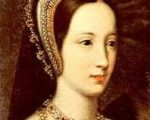
How much do you know about Mary Tudor, Queen of France, daughter of Henry VII and sister of Henry VIII? Test those little grey cells over your morning coffee with this fun quiz.
[Read More...]
In last night’s episode of “Who do you think you are?”, Eastenders actor Danny Dyer found out that he has royal blood and that he’s descended from Thomas Cromwell through Cromwell’s son Gregory. It’s a wonderful episode. I do love Danny Dyer, he’s so down to earth!
[Read More...]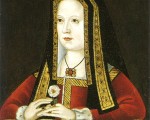
On 25th November 1487, St Catherine’s Day, Elizabeth of York, consort of Henry VII and mother of one-year-old Arthur Tudor, was crowned queen at Westminster Abbey. As Elizabeth’s biographer Amy Licence explains, her coronation had been postponed due to her pregnancy and then unrest in England.
[Read More...]